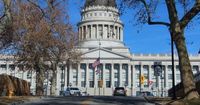Utah has been thrust into the national spotlight after a state judge ruled that its congressional map must be redrawn before the 2026 elections, a decision with sweeping implications for the state's political future and the broader battle over partisan gerrymandering in America. The ruling, delivered on August 25, 2025, by Third District Court Judge Dianna Gibson, comes at a time when redistricting controversies are boiling over in states across the country, with both parties maneuvering for advantage ahead of critical midterm elections.
Judge Gibson’s decision is the latest twist in a years-long saga over how Utah draws its congressional districts. At the heart of the dispute is Proposition 4, a 2018 ballot initiative narrowly approved by voters, which created an independent commission tasked with drawing fair and nonpartisan electoral maps. According to the Associated Press, Gibson ruled that the Republican-controlled Legislature had unconstitutionally repealed and replaced Proposition 4 in 2020, undermining the will of the people and violating their right to reform their government.
"Plaintiffs have proven, as a matter of law, that the Legislature unconstitutionally repealed Proposition 4, and enacted SB 200, in violation of the people’s fundamental right to reform redistricting in Utah and to prohibit partisan gerrymandering," Gibson wrote in her decision, as reported by Utah News Dispatch. The judge enjoined the state’s 2021 congressional map, which had split Salt Lake County—Utah’s population hub and Democratic stronghold—among four districts, all of which have since elected Republicans by wide margins.
The ruling sets a tight timeline for action. Lawmakers have until September 24, 2025, to submit new maps to the court. If their proposal does not comply with Proposition 4’s requirements, voting rights groups and other third parties may submit their own remedial maps for consideration. Candidates are set to begin filing for the 2026 midterm elections in early January, putting additional pressure on the Legislature to act swiftly.
The legal battle was brought by a coalition including the League of Women Voters of Utah, Mormon Women for Ethical Government, and the Campaign Legal Center. These groups argued that the Legislature’s actions not only favored Republicans but also trampled on voters’ constitutional right to alter and reform their government. The Utah Supreme Court had previously sent the case back to Gibson to determine if lawmakers could justify their changes to Proposition 4 under a "compelling government interest" standard—a bar they ultimately failed to meet.
For voting rights advocates, the decision marks a historic victory. David Reymann, attorney for the plaintiffs, called the ruling a “watershed moment in Utah for the voices of Utah voters.” He told reporters, “We have maintained from the start that the Legislature in this state is not king, that their power derives from the people. Today, the voice of Utah voters was vindicated by the district court, which held that the Legislature cannot ignore what the Utah voters enact without consequence.”
Elizabeth Rasmussen, executive director of Better Boundaries, echoed this sentiment, saying, “We are thrilled that the court has reaffirmed what we have known all along — that the people have co-equal lawmaking authority with the Legislature. That the Legislature violated the Utah Constitution when they overturned Proposition 4. And that Utahns deserve fair, independent maps they voted for almost seven years ago.”
Other reform advocates and Democratic leaders were quick to celebrate. Utah House Democrats declared, “Utah is now on the front lines of this national struggle, where the integrity of our democracy and the principle of fair representation are under direct attack. This decision is a powerful affirmation that voters of all backgrounds deserve a voice in the democratic process.” Utah Senate Democrats called on their Republican colleagues to “embrace this ruling and work together to create fair congressional maps that reflect the will of the people.”
Progressive political consultants see the decision as a turning point. Jackie Morgan, senior partner at Elevate Strategies, told Utah News Dispatch, “For years, the Utah Legislature has governed through manipulation, not representation. That era ends today. Fair maps will restore real competition to Utah politics and national observers should take note: Utah is no longer off the map.”
But Republican leaders and state officials expressed disappointment and signaled that the legal fight may not be over. Governor Spencer Cox, while respectful of the judiciary, said, “Today’s decision is not a surprise after the Supreme Court’s ruling last summer. While I respect the role of the courts in our system, I continue to disagree with that decision.” Senate President Stuart Adams and House Speaker Mike Schultz, in a joint statement, said, “While disappointed by the court’s decision, we remain committed to protecting the voices of Utahns and upholding the Legislature’s state and federal constitutional authority to draw congressional districts. We will carefully review the ruling and consider our next steps.”
Attorneys for the Legislature have indicated they may appeal to the Utah Supreme Court and possibly the U.S. Supreme Court, though the nation’s high court has previously ruled that partisan gerrymandering claims are outside the scope of federal courts and should be decided by states. With appeals likely, some observers worry that the process could be delayed, potentially pushing implementation of new maps to the 2028 cycle.
The roots of the conflict stretch back to 2018, when Utah voters, by a razor-thin margin, approved Proposition 4. The initiative established an independent redistricting commission to propose maps for Utah’s congressional, legislative, and state school board districts, with the aim of preventing partisan manipulation. But in 2020, the Legislature replaced the commission with an advisory body that lawmakers could ignore. In 2021, they did just that, adopting their own map and prompting the lawsuit that led to this week’s decision.
Utah’s case is part of a broader national trend. In 2018, four states passed measures to reduce partisan gerrymandering, but in several, legislatures quickly sought to roll back or weaken these reforms. Missouri’s Republican-led Legislature repealed key provisions, while independent commissions in Colorado and Michigan have remained intact. As the 2026 midterms approach, redistricting battles are also raging in Texas, Ohio, Indiana, Florida, and California, with both parties seeking to shore up their prospects in Congress.
For many Utahns, the ruling is about more than just political maps. Ryan Bell, a board member of Better Boundaries, summed up the broader significance: “The court’s decision shows the Constitution works. Checks and balances work. Our judicial system works. And our time-tested system of representative democratic government is going to remain strong after today.”
As Utah’s Legislature weighs its next moves and voting rights groups prepare to submit their own proposals, the state finds itself at the center of a national reckoning over democracy, representation, and the power of the people. The coming weeks will determine whether Utah’s congressional maps will finally reflect the will of its voters—or whether the fight for fair representation will stretch on.



